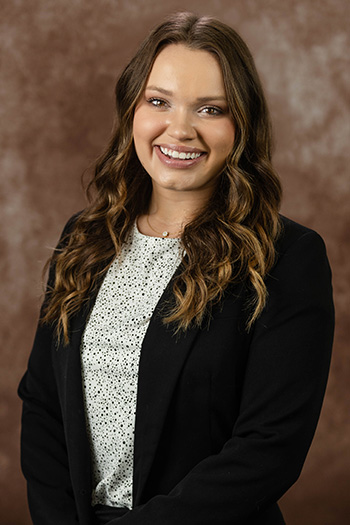
First-year medical student Megan Westphal has been a competitive figure skater for nearly two decades.
A recent competition, though, will perhaps be better remembered for what happened off the ice.
Westphal had just finished competing in the Kalamazoo Kick-Off Classic on Saturday, November 23, at Wings Event Center in Kalamazoo as a member of Western Michigan University’s collegiate team. She was sitting in the stands when her teammates informed her of a medical emergency.
An elderly woman had fallen on the concourse at the arena, resulting in multiple cuts to her face and a dislocated shoulder. Westphal, equipped with weeks of Medical First Responder (MFR) training as part of her first-year curriculum at WMed, jumped into action.
“I didn't have a lot of supplies, so I just started my evaluation and started asking her questions,” Westphal said. “I figured that was the best thing to do, as well as just keep her calm and talk to her to make sure that she was still coherent because she was bleeding quite a bit.”
Westphal used paper towels provided by a nearby security guard to help stop the bleeding while she waited for the on-site EMT to arrive. All radio communication was down in the arena at the time of the incident, so it took about 10 minutes for the EMT to find them, according to Westphal.
Once the EMT reached the scene, Westphal was able to obtain the woman’s blood pressure and blood glucose levels, assist in wrapping the woman’s shoulder and bandaging her other injuries, and perform a neurological exam to rule out concerns of a concussion. The woman was responsive throughout and ultimately declined to go to the hospital despite the shoulder injury.
Westphal said her ability to help the woman was a credit to the medical first responder training she received at WMed.
“Everyone kind of expects that when you're in medical school, you know how to respond to emergencies, but a lot of times you don't actually know how to do that until you're in your third or fourth year,” Westphal said. “That's unique to WMed in the sense that we actually do know how to respond in those instances, and we are authorized to, if something were to happen.”
WMed students receive training and are certified as medical first responders during their first year at the medical school. The two-week course qualifies students for national certification and state licensing as medical first responders.
MFR training is part of the medical school’s curriculum, which provides early exposure to the clinical setting, and the course equips students to respond when someone is ill or injured and provides instruction on basic procedures, including taking vital signs, performing CPR, bandaging, wound care and splinting, and assisting in childbirth, among other things.
The training continues for students after their first year with an advanced cardiac life support course along with field trainings and training in the medical school’s Simulation Center.
Westphal said the medical first responder training is one of the factors that ultimately drew her to WMed.
“Those are skills that we should all have as we enter the medical field. We should know how to respond to emergencies and help people and treat them and I think that's an essential component of it that's often just missed in a lot of the preclinical years,” Westphal said. “It's really cool to have experience working with patients and actually be able to feel like you're starting the career that you've wanted for so long. For a lot of us, this has been a really long process and when you get even little exposures like MFR it's so rewarding because this is what we want to do, and this is what we're excited about.”
